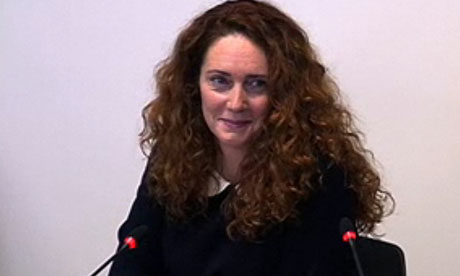Brooks's Leveson inquiry appearance
was a display of the empathetic arts she used to win round
politicians and celebrities
 |
|
Rebekah Brooks at Leveson: 'she revealed the qualities that
made her the darling of the political and showbiz worlds'.
Photograph: AFP/Getty Images |
Anyone who ever fantasised about being
famous got a salutary look at what for the last 20 years has been the
quid pro quo of British public life: what it's like to be turned over by
a tabloid.
Rebekah Brooks, former editor of the Sun
and the News of the World, then chief executive of News International
before resigning over phone hacking last year, spoke for several hours
at the Leveson inquiry.
Alternately empathetic and steely, she
revealed the qualities – described by those who knew and worked for her
as charm and warmth – that made her the darling of the political and
showbiz worlds.
At one point, describing Gerry and Kate
McCann, parents of the missing child Madeleine, she seemed so moved when
articulating their terrible ordeal, she had to look away. More cynical
observers, dazzled by her demure Peter Pan collar and modest expression,
might have assumed this was for effect. But remember Sara Payne and
Sarah's Law, the campaign for a paedophile register Brooks ran when she
edited the News of the World and publicly "named and shamed" convicted
offenders? That campaign was dismissed, derided and condemned as a
dangerous witch-hunt, particularly when the residents of an estate went
on the rampage, and a paediatrician had her job title misunderstood and
graffiti painted on her front door. Brooks could never understand the
reception. It was always obvious that she felt passionately about
Payne's plight. Her empathy led. The later revelation that the mobile
phone Payne was given by News International was one of those hacked, was
one of the most extraordinary of this entire shebang.
Watching her describe the circumstances
of the Sun's story revealing Fraser Brown's cystic fibrosis and
furiously denying Gordon Brown's allegation that the paper hacked into
his child's medical records, was a similar story. "If the Browns had
asked me not to run it, I wouldn't have done," declared a wide-eyed
Rebekah, who had earlier described Sarah Brown as "my friend". You
sensed she absolutely believes that, even as she fails to understand how
terrified the Browns were of her power; even as she denies having any
such influence; even as she denies the Sun ran a revenge attack on Brown
for suggesting that the Sun might have acted without proper morals.
Throughout this complex dance, the Sun reader – earlier described by
Brooks as being the only real source of authority at News International,
is cast aside.
Countless celebrities and politicians
experienced the Brooks velvet glove; the holding of your hand as the bad
news is delivered. We have the tape, the ex-lover, the drugs, the cash.
We know you're gay, having an affair, an addict or being blackmailed.
It's going to come out and it'll be so much better for you if we're on
your side.
Then comes the tell-all interview. My
shame, my hell, my secret life. And the redemption. Recovery. All
documented of course. We're on your side, you're on our team. Until
you're not.
Many of them ended up thanking her.
Being grateful. Sending warm text messages, perhaps. Piers Morgan would
josh, dare and goad you into it, but Rebekah Wade, as she was, was the
Princess Diana of tabloid take-downs, who understood you all the way to
the front page.
She was not the only editor who
practised this art. But she was hats off the best at it and today we got
to see how. |


